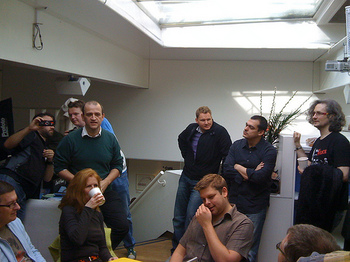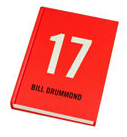30 November 02008
Social media old and new: two contrasting networks
 It's a year since I did a 'compare and contrast' blog post about two initiatives to build networking activity. To recap briefly, the RSA is a 254-year-old membership organisation devoted to art, design, business and the environment, currently with around 28,000 'fellows', which launched a Networks initiative on 22 November 02007 (I didn't go). The Social Media Café (a.k.a. Tuttle Club, named after Harry Tuttle), on the other hand, had its very first meeting on 21 November last year, and I did go. It aims to create spaces where people interested in social media can connect, socially and for business. So far, that has involved a series of weekly café sessions, which are 'prototypes' for something that may be more far-reaching. (The picture on the right shows, Lloyd Davis, Tuttle Club prime mover, making a brief announcement at the first birthday meeting nine days ago.)
It's a year since I did a 'compare and contrast' blog post about two initiatives to build networking activity. To recap briefly, the RSA is a 254-year-old membership organisation devoted to art, design, business and the environment, currently with around 28,000 'fellows', which launched a Networks initiative on 22 November 02007 (I didn't go). The Social Media Café (a.k.a. Tuttle Club, named after Harry Tuttle), on the other hand, had its very first meeting on 21 November last year, and I did go. It aims to create spaces where people interested in social media can connect, socially and for business. So far, that has involved a series of weekly café sessions, which are 'prototypes' for something that may be more far-reaching. (The picture on the right shows, Lloyd Davis, Tuttle Club prime mover, making a brief announcement at the first birthday meeting nine days ago.)
One year on, how are they each doing? Where do they converge and diverge?
Let me see if I can build up some dramatic tension here, to make it into a good story. Is the Tuttle Club the 21st century analogue of coffee house meetings that led to the formation of the RSA in 01754? Will the RSA be shown up as a lumbering beast of the 18th century, unable to move quickly or be flexible because of all its baggage, so that the Tuttlers can run rings round it? Or will the Tuttle Club turn out to be a typical Web 2.0 phenomenon, supported by an initial wave of enthusiasm and attention but zero revenue, and at risk from the capricious mood of its freelance participants, who will lose interest when stronger commitments are required of them, or when they (errr, we) finally have to resort to getting proper jobs?
Continue reading "Social media old and new: two contrasting networks "28 November 02008
My five mind apples
Mindapples is a social movement to promote individual self-management of mental wellbeing. The original “5-a-day” campaign encouraged people to take care of their physical health through simple daily activities, and we want to do the same thing for mental health. We aim to create a stigma-free public debate about mental wellbeing, simply by asking everybody the question: “What’s your five-a-day?” [source]
Mindapples was conceived by the very smart Andy Gibson (also one of the School Of Everything team), and he has cheekily blogtagged me to get me to publish my five-a-day.
This comes with the warning that my mind feels fairly badly inspissated at the moment, but that may be because I've not been getting all five sufficiently regularly.
- Meditation, or bathing a baby. Best to get the most embarrassing out of the way first. I've tried different types of meditation, guided either by tapes of Alan Watts or by the Meditation Trust. However, there are other methods if you don't want to come on like a new age hippy. In his Autobiographical Statement, John Cage wrote of his practice of zen buddhism, "I have never practiced sitting cross-legged nor do I meditate. My work is what I do and always involves writing materials, chairs, and tables. Before I get to it, I do some exercises for my back and I water the plants, of which I have around two hundred." A film shown at the John Cage Uncaged weekend documents this enormous array of plants above 6th Avenue, and the intricate instructions for watering them — you wouldn't have wanted to apartment-sit for him. Since I became a dad, finding time to meditate has been harder, but in its place I have the evening bath, feed and bedtime of my four-month-old son: the arrangements of bath water and thermometer, sleep suit and dummy, hot water bottle and towel, feeding bottle and LP cued up on turntable, not to mention the actual washing routine, are almost on a par with Cage's plants.
13 November 02008
Fighting cultural surplus: a review of Bill Drummond's 17
 When Brian Eno released his Generative Music 1 album — music that is created 'on the fly' by a computer following a set of rules that Eno programmed, released on floppy disk, and now virtually unplayable on any current hardware — he wrote "I really think it is possible that our grandchildren will look at us in wonder and say: 'you mean you used to listen to exactly the same thing over and over again?'".
When Brian Eno released his Generative Music 1 album — music that is created 'on the fly' by a computer following a set of rules that Eno programmed, released on floppy disk, and now virtually unplayable on any current hardware — he wrote "I really think it is possible that our grandchildren will look at us in wonder and say: 'you mean you used to listen to exactly the same thing over and over again?'".
If you were feeling mean, you might classify a strand of Bill Drummond's musical output as an agitprop popularisation of some of Eno's ideas. 17 fits that profile, as Drummond wants to play his part in getting rid of recorded music and perhaps not just recorded music. "Imagine waking up tomorrow, all music has disappeared," begins one of his many manifestos. He declares Year Zero in the history of music, razing what has gone before and starting again — and all of this single-handedly, or with a bit of help from some travelling companions and some yet-to-be-convinced schoolchildren.
What's interesting about the campaign Drummond conjures in 17 is that it re-interprets the current state of the recording industry not as a commercial crisis, but as a cultural one.
recorded music has run its course, it has been mined out. It is so 20th century, like paper money and fossil fuels… all (or should that be 99.99 percent?) of music being written, composed, created [is] done to be recorded, and once recorded, to be experienced in a very limited way.
The first hundred or so pages are carried by Drummond's commitment to asking the basic-but-necessary questions and articulating his discontent:
What is music for? And why do we listen to it in the way that we do? And what would it be like if…? But the big questions seemed to be 'Why am I so frustrated with it?' and 'Why do I want it to be something other than it is?' and 'Why do I want it to exist in some other sort of way than it already does?'Continue reading "Fighting cultural surplus: a review of Bill Drummond's 17"

Subscribe to my RSS feed, which covers this blog, my book blog, and further commentary on other web resources (more feeds below)
My five mind apples
Fighting cultural surplus: a review of Bill Drummond's 17
Cinema (24)
Cultural Calendar (86)
Curatorial (66)
E-learning (102)
Events (35)
Future of Music (95)
Human-Computer Interaction (62)
Ideas and Essays (37)
Long Now (18)
Miscellany (44)
Music and Multimedia (157)
Playlists (27)
Podcasting (12)
Politics (12)
Radio (48)
Reviews (58)
Social Software (60)
Teaching (23)
Alternatively, see the Date-based Archives
Recommended: RSS feed that combines items on this site, my book blog, and commentary on other web resources
RSS feed for this site only
RSS feed for my book, Net, Blogs and Rock'n'Roll
RSS feed for shared bookmarks
My latest bookmarks (click 'read more' for commentary):
My archived bookmarks (02004-02008)
On most social sites I am either 'davidjennings' or 'djalchemi', for example: Flickr, Last.fm, Ma.gnolia and so on…
Lateral Action — managing creativity
Herd — social cognition
Seb Schmoller's e-learning mailings
Viridian Design Movement
Tom Phillips — artist
Long Now blog — resources for long-term thinking
Longplayer live stream — 1,000-year composition

The contents of this site are licensed under a Creative Commons Licence except where otherwise notified.
Hosted by Paul Makepeace
W3C Standards
Check whether this page is valid XHTML 1.0
Check whether the CSS (style sheet) is valid

